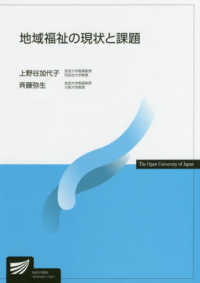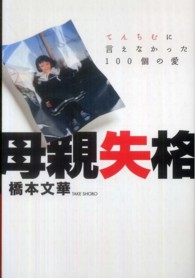- ホーム
- > 洋書
- > 英文書
- > Literary Criticism
Full Description
This book is the first major study that explores the intrinsic connection between music and myth, as Nietzsche conceived of it in The Birth of Tragedy (1872), in three great works of modern literature: Romain Rolland's Nobel Prize winning novel Jean-Christophe (1904-12), James Joyce's modernist epic Ulysses (1922), and Thomas Mann's late masterpiece Doctor Faustus (1947). Juxtaposing Nietzsche's conception of the Apollonian and Dionysian with narrative depictions of music and myth, Josh Torabi challenges the common view that the latter half of The Birth of Tragedy is of secondary importance to the first. Informed by a deep knowledge of Nietzsche's early aesthetics, the book goes on to offer a fresh and original perspective on Ulysses and Doctor Faustus, two world-famous novels that are rarely discussed together, and makes the case for the significance of Jean-Christophe, which has been unfairly neglected in the Anglophone world, despite Rolland's status as a major figure in twentieth-century intellectual and literary history. This unique study reveals new depths to the work of our most enduring writers and thinkers.
Contents
Prelude: Chasing the Ineffable
1. Schopenhauer, Wagner and Nietzsche: the Musicalization of Myth and the Mythologization of Music in The Birth of Tragedy
Musico-Mythic Beginnings
Schopenhauer's Metaphysics of Music in The World as Will and Representation
Wagner: Musicalizing Nation and Myth in Beethoven
Nietzsche's Aesthetic Models of Music and Myth in The Birth of Tragedy
Towards a Nietzschean Configuration in the Modern Novel
2. Jean-Christophe: The Silent Music of the Soul
The Genesis of Jean-Christophe
A Born Musician: Jean-Christophe's Early Years
The Roots of Artistic Creation: Jean-Christophe the Creator
Music Fictionalized: Jean-Christophe's Compositions
Divisions: Apollo, Dionysus and Franco-German Musico-Literary Relations in Jean-Christophe
Jean-Christophe's Final Voyage: Improvisation, Italy and Late Music
3. Joyce's 'Gesamtkunstwerk': Performative Music and Mythic Method in Ulysses
Approaching Music and Myth in Ulysses
Stephen Dedalus-Dionysus: A Portrait of the Artist's Aesthetic Theory in "Proteus"
From Apollo to Bloom: Resisting Songs in the "Sirens"
And Behold: Leopold Could Not Live Without Stephen! The Apollonian and Dionysian,
Side by Side in "Eumaeus"
Home at Last: Stephen Speaks the Language of Bloom; and Bloom, Finally the Language
of Stephen; and so the Highest Goal of Comedy and of Ulysses is Attained.
Myth Updating in Ulysses
4. The Pact: Music and Myth in Thomas Mann's Doctor Faustus
Demonic Origins
Mann and Myth
Part I: Adrian Leverkühn's Education
Kretzschmar's Lectures
Part II: Why Adrian Leverkühn Writes Such Good Music
The Early Works
Apocalypse Now!
The Great Lament: Adrian Leverkühn's Masterpiece and Faust's Redemption
Reprise: Myth and Music as Motifs in the Modern Novel








